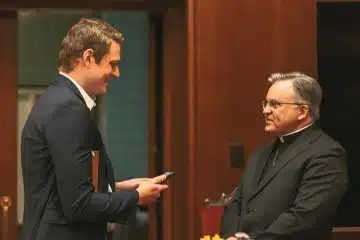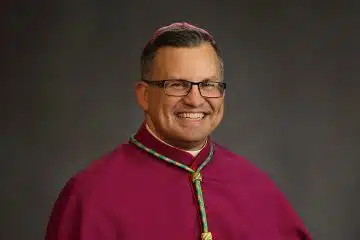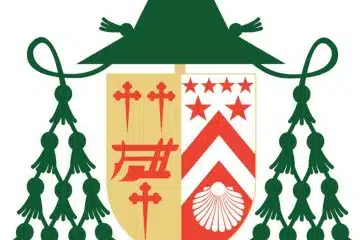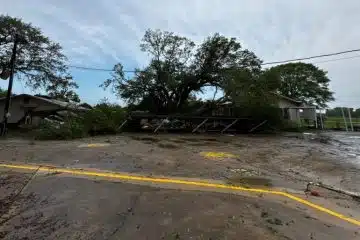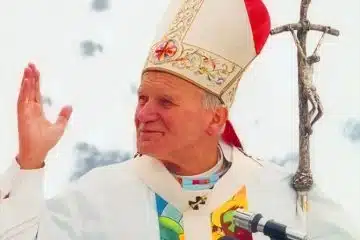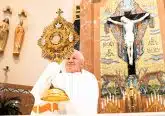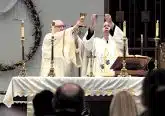Families of Parishes: Being a Synodal Church
This article is part of a series from Father Earl Fernandes exploring Families of Parishes. Click the links below to find other articles in the series.
The Church as the Family of God
Families of Parishes as Evangelizing Communities
Synodality Walking with Christ, The Holy Spirit and the Virgin Mary
Synodality in the Church of the Church
Families of Parishes Discernment and Co-Responsibility
In the first two articles of this series, we explored the foundations for Beacons of Light. The first described the Church as the Family of God, and the second shared characteristics of an evangelizing community. Each Family of Parishes formed through the Beacons of Light process is called to make known the joy of the Gospel. The experience of being a Family of Parishes will bring both challenges and blessings. In this article, I will describe Beacons of Light as a journey rooted in our belief in the Triune God.
Growing up, most of us took a family vacation, a journey, with hope for renewal. Those adventures were filled with many joys and likely a few mishaps. The Greek word synodos means “to be on the journey together” as in a caravan or religious pilgrimage (Lk. 2:41-44). As the Archdiocese of Cincinnati journeys into the future, we do so together.
A PILGRIM CHURCH
We are a “pilgrim Church,” journeying toward the heavenly Jerusalem. Significantly, in Lumen Gentium (LG, 9-17), the Dogmatic Constitution on the Church, the Second Vatican Council addresses the “People of God” before addressing the hierarchy. Prior to this document, a pyramidal view of the Church, with the bishops and priests on top and the laity on the bottom, dominated. With the document’s promulgation all the baptized, with their distinctive roles, could understand their vocations as a service to the Church.
SYNODALITY
Synodality is a way of living the faith in a permanent way at every level: in the parish, in the family and at the peripheries. All Church members, not just the clergy or experts, are to be engaged in this way of living. Synodality describes the journeying together of the People of God toward the New and Eternal Jerusalem.
Pope Francis calls us to be a synodal Church, a Church that walks together. He spoke of this at the 50th Anniversary of the Institution of the Synod of Bishops in 2015, stating that it is “precisely this path of synodality which God expects of the Church of the third millennium.” He echoed Pope Benedict XVI in saying that synodality is a “constitutive element of the Church” and described it as “nothing other than the ‘journeying together’ of God’s flock along the paths of history towards the encounter with Christ the Lord.”
A synodal Church is one that listens and “which realizes that listening is more than simply hearing.” This involves listening not only to one another, but also to the Holy Spirit to know what “he says to the churches” (Rev. 2:7). Listening affirms each person’s dignity and expresses respect for the voices, legitimate desires, problems and sufferings of the People of God.
The process of listening begins with the People of God, who, by virtue of their baptism, share in the prophetic office of Christ. Priests and bishops, attentive to the voice of the flock, listen to God to act rightly and give credible witness to the apostolic faith. The process converges to a point of unity in faith, facilitating an encounter with the Lord in truth.
THEOLOGICAL BASIS
What are the theological foundations for understanding the Church as a Family of God that journeys together? That is, if parishes will be grouped together into “Families of Parishes” in order to discern a future together that best serves evangelization, on what theological basis might this be done?
We begin almost every prayer with the sign of the cross, invoking the Trinity. While we will delve deeper into the theological foundations of Beacons of Light in upcoming months, our belief in the Trinity is a good starting point. There is a clear Trinitarian imprint on the understanding of the Church in the documents of Vatican II, which describe the Church as “a people made one with the unity of the Father, Son and Holy Spirit” (LG, 2-4). One speaks of a “Trinitarian synodality” ad intra, referring to the dynamic relationship of the Persons of the Trinity as a communion of love, and a “Trinitarian synodality” ad extra, in which the persons of the Godhead “journey together” toward all of creation, the Church and humanity in history. The Father, Son and Holy Spirit are the model for all forms of synodal living and, therefore, of a model of living as the Church.
The Scriptures allude to this in the Divine “We” in the story of creation (Gen. 1:26), in the visit of the three guests to Abraham (Gen. 18:1-5) and in the journey of God toward His people through the covenants of the Old Testament, culminating in the Messiah, who offers salvation to Jews and Gentiles alike. The New Testament, especially the Annunciation (Lk. 1:26-38), recounts the Incarnation as a Trinitarian action – a journeying together: the Father sends the Holy Spirit to overshadow the Virgin so the Eternal Word of the Father might become incarnate. In the Trinity, there is communion and reciprocity among the Persons and an outpouring of love toward humanity.
The Father, Son and Holy Spirit journey together in harmony. The Triune God journeys together toward all of humanity. The Father, Son and Holy Spirit journey with us as we discern the way forward for our archdiocese. In turn, we, as Families of Parishes, must journey together, open to the promptings of the Holy Spirit and guided by the living Word (cf. Ps. 119:105).
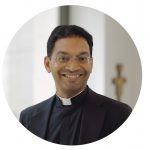 Father Earl K. Fernandes is the pastor of St. Ignatius of Loyola Church in Cincinnati and holds a doctorate in moral theology from the Alphonsian Academy in Rome.
Father Earl K. Fernandes is the pastor of St. Ignatius of Loyola Church in Cincinnati and holds a doctorate in moral theology from the Alphonsian Academy in Rome.
This article is in the October 2021 edition of The Catholic Telegraph Magazine. For your complimentary subscription, click here.



